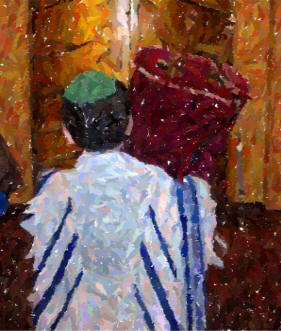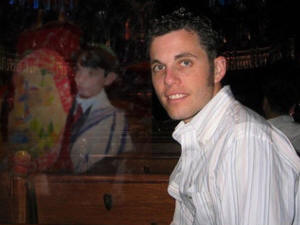|

At thirteen,
I became what most Jewish boys become at that
age: A Bar Mitzvah.
The
passage into adulthood is, for those cultures
that celebrate such an event, a strenuous event,
and becoming a Bar Mitzvah is no different. I
believed, at the time, however, that the process
of preparing for this important event was the
worst torture imaginable; I spent countless
hours memorizing my torah portion (which was
necessary since I did not know the Hebrew of the
torah well), and even more writing and
practicing my speech.
Don’t misunderstand me. I knew (to a certain
extent) why I was going through the
process, and in many ways was excited about it,
but I also knew that regardless of my feelings
about becoming a Bar Mitzvah, I didn’t have a
choice. This is not to say that I was told that
I would be a Bar Mitzvah or else; Certainly if I
put up enough of a fight I would not have been
forced into it. I felt, though, that the event
was important. It had meaning for me, and I
would appreciate it, if not at the time, than
perhaps later.
It was my first time in front of such a large
crowd of friends and relatives. I’d performed
on stage a few years before in a school
production of Fiddler on the Roof, but
that wasn’t like this time: the lights weren’t
blinding in the synagogue, so I could see every
face. They all were waiting to see a performance
— mine — on the bimah (pulpit). I was on show,
for everyone that was close to me. This wasn’t
what Rabbi Widom had described to me so long ago
when I began my studies; It wasn’t supposed to
be a performance, with rehearsals and the
memorizing of lines.
Becoming a Bar Mitzvah was about my
passage into adulthood; It was for
me. Yet standing at the podium, reading from the
torah, I couldn’t help but feel that the process
was as much for them — my family and friends —
as it was for me.
This was how it began as I walked down the
center aisle with the rabbi. The performance
was starting, and every face in the synagogue
was turned towards me. “I’ve got this under
control,” I muttered to myself, under my breath.
I felt like I was teetering on the edge of some
high cliff, ready to stumble and fall if I made
one mistake. I didn’t have anything under
control — I was just kidding myself.

|
|
The rabbi made a subtle gesture for the
congregation to sit, and put a consoling hand on
my shoulder; He knew what I was going through,
but that knowledge wasn’t much comfort.
He pointed to a passage in a prayer book
laid out on the podium, and as he did, my
stomach sunk to the bottom of my feet, and I
felt the sweat dripping from my forehead. I was
anxious as hell, but I couldn’t back off. I
glanced at the audience in front, but this only
made the matter worse. A million years passed as
I stood, waiting for a sound — any sound — to
come from my mouth. I took a deep breath, closed
my eyes, and started automatically. I was
reciting the prayer (although I wasn’t sure it
was me, and not some outside forcing moving my
mouth).
Most of the service, I felt like I was outside
myself, looking in. Time whipped by in a blur.
Yet I was doing it — performing exactly
that which I had practiced so long and so hard.
More important, I was enjoying this performance;
It was enjoyable to see the smiling faces before
me, knowing that they are listening to me alone
— I was their sole purpose for sitting in the
synagogue that Saturday morning.

.
The service was over before I realized it. One
hour, forty two minutes and thirty three
seconds had passed, and I walked out of the
synagogue with the rabbi the same way I had
entered.
As the rest of the congregation joined us
outside to have some challah, I realized that
the process was over, I was a Bar Mitzvah: I
made my speech, said the prayers, read from the
Torah — all without incident. I felt relieved
that the service was finally over, yet yearned
for something to look forward to. I had the rest
of my life as an adult ahead of me, and I was
excited to explore my new found manhood, but I
wanted a more immediate, and less ethereal
expectation. I realized, at that point, that the
whole point of the rite of passage into
adulthood was the process, not the end result.
By practicing, and readying myself, I learned
patience and discipline; By performing the
ceremony, I learned to face my anxiety, and deal
with it.
My mother ran over and hugged and kissed me, and
my father walked over and extended
his hand. “You did great, Dana,” he said,
shaking my hand, “Now you are a man.”
|
His Memoir
originally written in 1994,
Dana
Spiegel - Now serves as the
Executive Director and a member of the
Board of Directors of
NYCwireless, a New
York City non-profit organization that
advocates and enables the growth of
free, public wireless networks, and
writes the
Wireless
Community Blog
http://www.wirelesscommunity.info/about
Dana Spiegel is also an independent
software consultant and founder of
socialeDESIGN,
social software and wireless technology
consulting firm.
Dana holds a Bachelors Degree in
Brain and Cognitive Sciences from MIT
and a Masters Degree in Media Arts and
Sciences from the MIT, MIT Media
Laboratory, Sociable Media Group.
Bar Mitzvah photo courtesy of Sue
Lund Photography. Art Images Howard
Walstein
Copyright Notice 2008, FunSimcha.com.
All rights reserved. This material may
not be reproduced in any form without
permission.
|
|